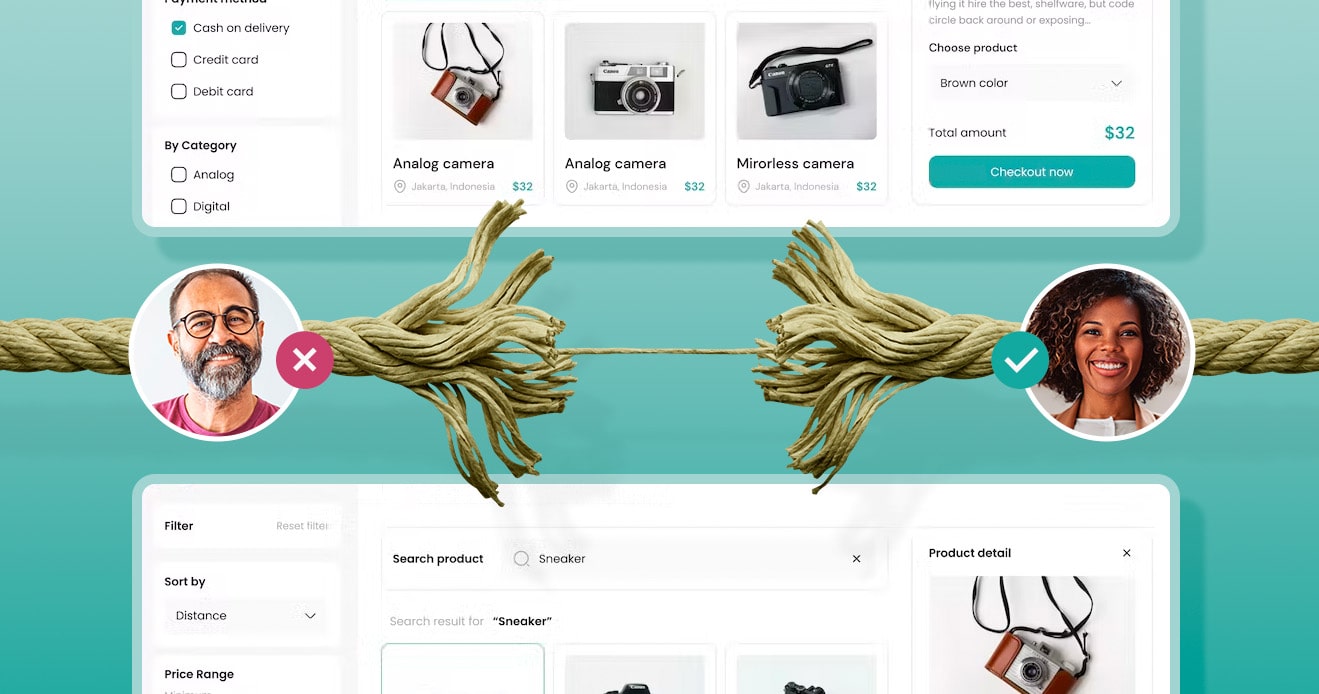- Blog
- Why Online Identity Verification is Critical for Peer-to-Peer Marketplaces
Why Online Identity Verification is Critical for Peer-to-Peer Marketplaces
Find out why marketplace identity verification should be an essential part of your security strategy.
Subscribe to Incognia’s content
P2P marketplaces bridge the gap between the digital and real world. Whether it’s through goods that are bought online and shipped, vacation rentals, or in-person meetings, there’s always a safety concern when the interactions people have online extend into the physical world. As facilitators of these interactions, P2P marketplaces have a responsibility to make the process as safe as possible for users. Online identity verification is one link in a long chain of solutions that helps keep users safe and engaged on P2P marketplaces.
Examples of some of the most popular online identity verification methods today include email or phone verification using confirmation links or codes or linking social media or bank accounts to the marketplace. Platforms can also ask users to upload pictures of government-issued IDs or official documents like a lease or utility bill for comparison with a selfie or live video. These verification steps have long been established as a must for financial institutions, but today P2P marketplaces are adopting them, too.
But marketplaces are not financial institutions, so why is identity verification critical for them as well?
Key TakeAways
- Identity verification for online marketplaces helps in promoting trust, reducing fraud risks, and improving Trust & Safety initiatives
- It's important for marketplaces to manage the balance between improving user verification and keeping friction at an acceptable level
- Document-based verification, linking a bank account, and real-time address verification are among popular identity verification measures for online marketplaces
What are the benefits of online identity verification for marketplaces?
Any online marketplace with a payments component has to meet the associated regulatory requirements.
In a Marketplace Risk webinar about online platforms and digital identity, Jennifer Kelly of Etsy explains, “Etsy has a payments platform, and so, as a payments provider, you have certain regulatory obligations to verify or know your sellers— KYC… They're the same processes that you would see at a PayPal or even a bank, but that has evolved into something that's much greater than just satisfying a regulatory obligation.”
For many online marketplaces, verifying seller identities is a regulatory-driven exercise. But, as Kelly points out, it has the power to evolve beyond a legal necessity into something with real strategic value.
With that said, stakeholders have a limited amount of time and resources to allocate to different aspects of their operations, so any new or increased investments have to undergo a cost-benefit analysis. The benefits of identity verification for online marketplaces are numerous.
1. Marketplace scam prevention
Being scammed online is a lose-lose for the good user and the platform itself; only the scammer wins in these scenarios. Scam victims can always report scammers after the fact, but this approach is reactive instead of proactive. In other words, banning scammers after they’ve already made listings is often too little, too late.
On the other hand, identity verification techniques can help prevent these scams before the bad actor even finishes onboarding to the platform. While some basic verification methods like phone numbers and emails are easily spoofed, more innovative ID verification methods like address verification can throw the risk-to-reward ratio into the red for the average scammer. Scammers who can’t anonymize themselves or hide behind spoofed or stolen PII are much more likely to move on to other, easier targets.
2. Stopping counterfeit sales
In the United States, selling counterfeit goods like fake handbags, designer clothing, and other items is illegal. In the past, online marketplaces haven’t been liable for independent sellers who sell counterfeit goods using their platform (though most marketplaces still have policies against this practice and any other illegal sales). However, the Shop Safe Act, a bill introduced in 2021, proposes making online platforms liable for counterfeit listings.
It’s clear that copyright violations and counterfeit goods pose a risk for P2P marketplaces, but reviewing individual listings for authenticity is a massive drain on content moderation resources. Improving identity verification is a much more efficient way to block fake listings by stopping bad actors before they create an account.
Verification banners, like the profile badges available to sellers on eBay and OfferUp, can help remove some of the guesswork for buyers who may be concerned about getting a fair deal.
3. Decreased marketplace fraud risk
A fraudster’s ability to mask their true identity is one of their strongest tools. Identity verification techniques, including address verification, work to make that even more difficult, increasing the risk of exposure when attempting to commit scams or policy abuses online.
Strong verification at onboarding also means that even if bad actors do shoulder the risk of committing fraud under their own identity, it’s much easier to permanently ban them from the platform and to collaborate with law enforcement where applicable. Anyone who wants to commit abuses on an online platform has to consider the risks—a permanent ban or even civil or legal penalties—against the rewards, which is usually unearned money or goods. The higher platforms can make the risks of committing fraud, the more likely bad actors are to go looking for a different, less chancy target.
4. Increased trust and safety
When users have a verified address or identity, platforms can display that status to other users, indicating that they’ve undergone some ID verification and are thus less likely to be a bad actor. This encourages users to put their money and trust into the platform without fear of being scammed or otherwise hurt by their engagement. This status also rewards good sellers for passing verification, while making those who fail or skip verification less attractive to buyers.
Travis Dawson of StockX discussed in a recent webinar how incentivizing verification can be more effective than relying on penalties alone:
5. Improved customer experience
Most marketplace shoppers don’t like feeling like they’re taking a leap of faith every time they buy from a new seller. Similarly, sellers have a better experience on a platform if they can trust that potential buyers are legitimate and not social engineers or running advance payment scams. When marketplace users know they can trust the platform and other users, the P2P marketplace experience becomes much more attractive.
Zuul Yakub, Incognia's SVP of Customer Success, explains in this clip how solid user trust can support marketplaces in their growth efforts:
6. Better customer retention
It’s no secret that trust is a huge determining factor in whether users engage with and return to a given ecommerce site. Over half of consumers are willing to return to a marketplace after a positive buying experience, and trust in a familiar marketplace can encourage users to buy even from unfamiliar sellers. Customers that trust a P2P marketplace and the users on it are more likely to return to that marketplace and choose it over other options. Given the choice, marketplaces that only require the minimum to post a listing are going to lose to those that go the extra mile to make users feel safe and secure in their communications and transactions.
What are the best online identity verification methods?
Accurate identity verification methods are a vital component of making sure that marketplaces can reap all of the benefits mentioned above. If a fraudster can easily use stolen or made up information to bypass a verification check, then they’re far less likely to be deterred. While marketplaces may not yet have the same stringent KYC requirements as financial institutions, it still matters that any ID verification technology they invest in does its job well.
1. Uploading a photo of a government-issued ID
Though it can add some user friction and introduce new privacy obligations for a platform, requesting users to digitally produce their government-issued photo ID for comparison with a recent selfie or video is one secure way to verify someone’s identity, and few scammers are likely willing to commit to the effort it would take to circumvent this measure for each new account.
2. Linking a bank account
As mentioned above, financial institutions are obligated to follow KYC regulations that include verifying the identity of people who bank with them. By asking users to connect their verified bank accounts to the marketplace, platforms can make it much more difficult for scammers to stay anonymous and avoid compromising their ill-gotten gains.
3. Address verification
When used effectively, address verification at onboarding can be an excellent way to weed fraudsters out before they even have the chance to join the platform officially. Many address verification softwares use an API call to an address database to compare user input with database address information. If there’s a mismatch, that user fails verification. While this method of address verification can be weak to recency concerns and fraudsters using stolen PII, other types of address verification are much more resilient.
For example, real-time address verification that compares a user’s address input with their current, real-time location data can bypass any attempts to use stolen or made up consumer information. This process can also occur in the background, meaning that it adds no additional user frustration to the onboarding process.
Verifying user identity on a marketplace, especially a new one, can often feel like a Catch 22. No one wants to scare new users away with a cumbersome verification system, but without it, users are more vulnerable to scams, which can also negatively impact growth. Each marketplace's needs will vary, but prioritizing passive, low-friction verification solutions can be an excellent way to have your security cake and eat it too.
To learn more about how Incognia is verifying users with as little friction as possible, contact a member of our team today.




